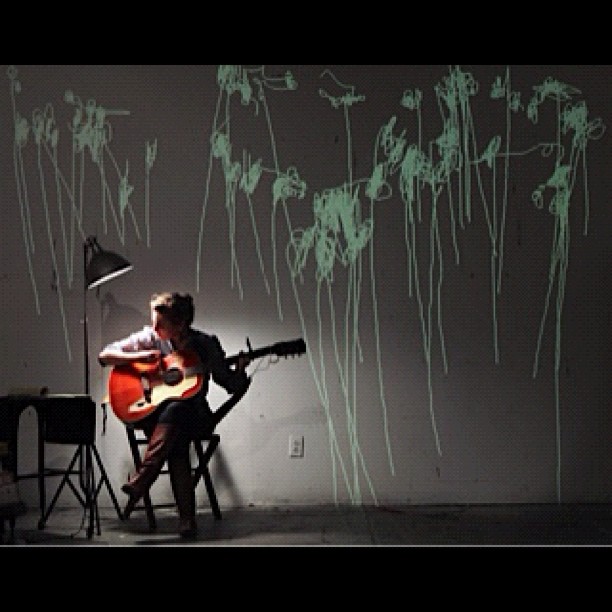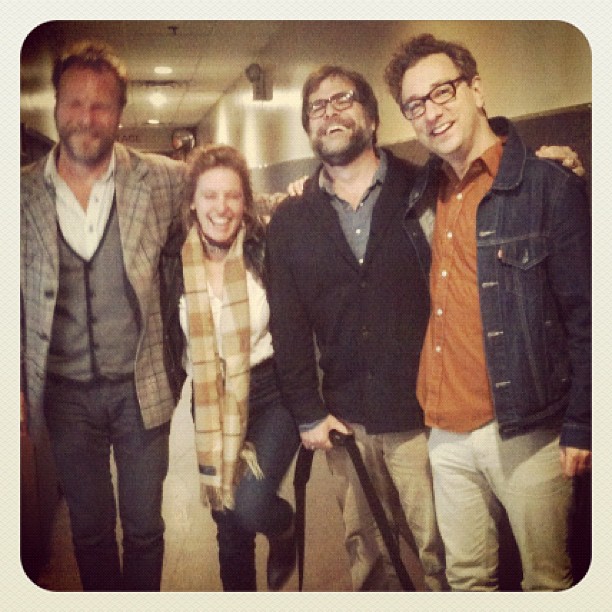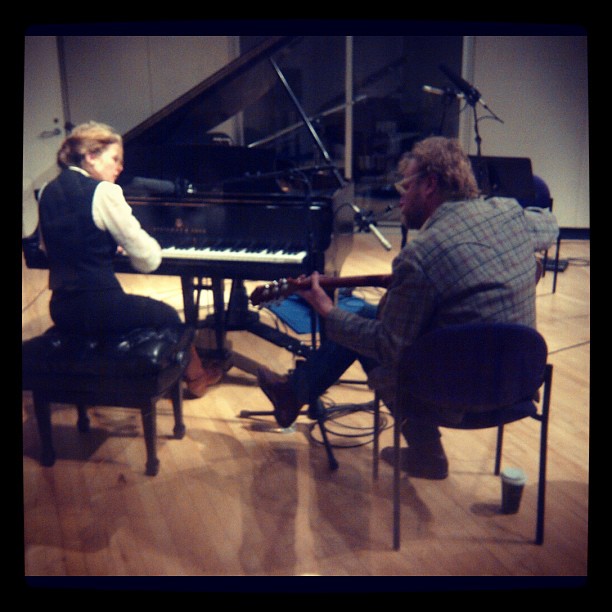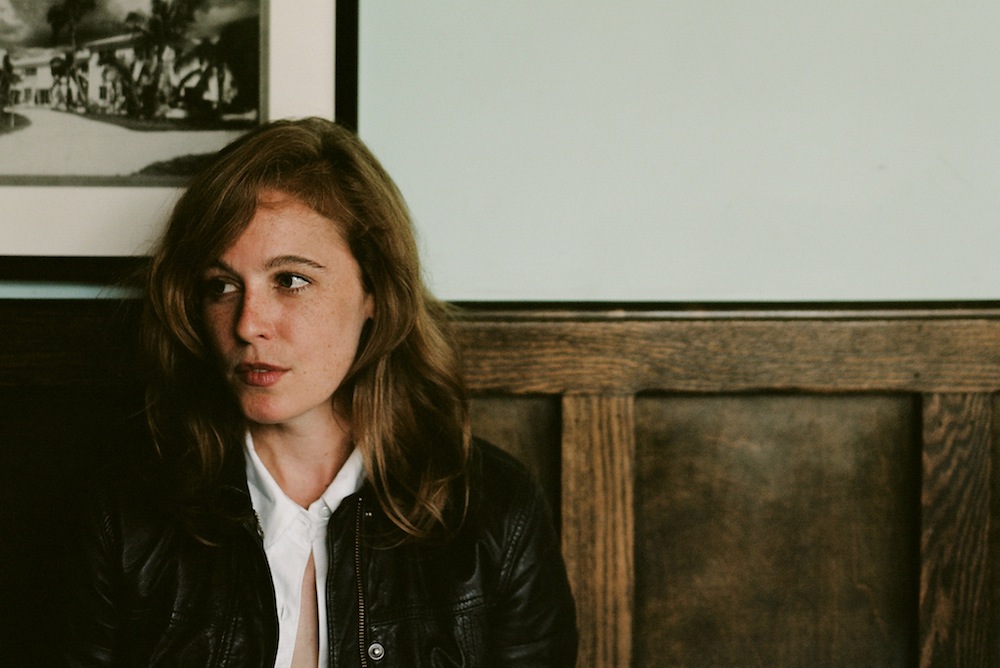By way of introduction, let me say that Tift Merritt is probably the nicest person I’ve spoken to ever. I would not only happily bake a batch of cookies for her, I’d make her a layer cake. I’d knit her a sweater. I’d man her merch booth. She’s just that nice in a phone interview. And she’s also smart and insightful, which is no surprise to anyone who’s listened to any of her songs. But still.
Merritt grew up in Raleigh, N.C. and , although her dad encouraged her to play piano and guitar, she headed off to UNC Chapel Hill to study creative writing. It was at college that she met drummer Zeke Hutchins (he’s played with Johnny Irion and Sarah Lee Guthrie, Thad Cockrell, Stillhouse and more). After hearing a tape of her songs, Hutchins encouraged Merritt to start a band with him. The two married in ‘09 and live in an apartment in New York.
Merritt is currently on tour (with Hutchins as her drummer, natch) in support of her fifth studio album, Traveling Alone, which was released in October of last year. She’ll play The Grey Eagle on Thursday, Feb. 21. David Wax Museum opens. 8:30 p.m., $15.

Mountain Xpress: I should have looked at your tour schedule before I called you…
Tift Merritt: No you shouldn’t have. I’m in Milwaukee. Don’t worry about it.
So how is this tour going?
It’s going great. We’re having such a great time. I feel really proud of how we’re playing right now.
What about it is making you happy?
Music is one of those things that it’s kind of an endless thing. It’s a bottomless place. The more you’re willing to spend time with it and have the courage to go deeper, there’s always more there. I have a really great group of people around me right now who are really willing to go to that place. Listening is such a huge, fundamental everything part of music. Everybody here really listens and, I think, [we] try to hit that true pitch from the heart.
Do you find that music and songwriting still has the capacity to surprise you?
Good lord! More so over time. I think you become a better instrument for music to give you those surprises because you’re calmer, you’re steadier, your time is better, your pitch is better, your heart is more open, you’re stronger. Music will serve up whatever you are ready for.
It’s been four months since “Traveling Alone” came out — how are you feeling about it? Do the songs evolve for you as you tour them?
I think it’s always an emotional experience as much as anything. In terms of arranging and that kind of thing, that stuff is more for older material. I’m often surprised at what I’m interested in from that. What touches me and what doesn’t from my past work. The new record is so very much the skin that you have lived in and it feels important to play it with a lot of presence.
It seems like it would be an interesting experience to have a record (literally) of where you were emotionally and physically at different points in time, and to be able to go back and revisit those experiences through songs that you wrote. Are there ever times you feel resistant to that?
Nobody wants to look at their yearbook pictures, do they? (Laughs.) It’s kind of the same feeling. Then there are things that you go, “Huh, I wonder how I did that when I was a kid?” That’s what’s surprising. You just make work with your heart and you do the best that you can and try to see clearly. You don’t know what’s going to stand up and last. There’s a natural relationship with your older material. Sometimes you’re tired of a song that you’ve been playing a lot, so you play something different. I’m proud that I have a decent amount of work to choose from right now. Of course you roll your eyes at some younger version of yourself, at whatever illusion you had. But when you find something that still is a good enough song that it sort stands apart from you, and whoever you were at that time, it’s a nice feeling. It’s a worthwhile pursuit.
You’re also a photographer.
No, I’m a hack.
Well, I was going to ask if you were doing much with that these days…
Photography is really something that I turn to when I’m writing. Like a muscle memory to remember to use your eyes and look outside of yourself and see the world. I think it’s a really good visual tool for a writer. That’s the kind of photographer I am. Being the center of attention can be such a weird thing. I want to be sure that, when people give me quality attention, I send something equivalent back out into the world. It’s very important to me to be able to do that. In those two ways I love photography. But I do it in a lot of ways as as a creative balance.
Creativity is such a messy drawer. We live in a time when people put a product out and they say, look at this perfectly formed piece of genius spring forth fully-formed. And that’s just not true. There’s so much collateral work that goes into any major thing. I don’t think that the collateral work is a substitute for that major thing, but I think it’s interesting to remember that that collateral work is there.

On your interview program, The Spark, you asked Andrew Bird about the mental difference between composing and performing — I’d like to ask you the same thing.
My own feelings about that are that they are opposites. I think writing is this amazing time where you are just able to swim in the ocean inside. You just sound time with it and you look around and you kick its tired and you nurture it. It’s the most private thing I do, it’s the most interior thing I do. What a luxury. Performing — there’s so much work leading up to the moment of performance. It’s like this moment where you turn it all inside out and you invite people to come see, to come sit at your table. There are a lot of hours of energy going out into the world to make a connection. Not in an overwrought way, but the energy is directed in two totally different directions.
Since you grew up in North Carolina, do you still identify yourself as a North Carolina musician?
Absolutely. No if, ands or buts.
Are there specific ways in which where you’re from impacts your sound or writing?
The only thing that’s more formative in my life that North Carolina is my family. When I think about North Carolina, I think about a sense of place, I grew up in North Carolina in a time when regionalism was all there was. I grew up in a town where everybody knew your parents and you biked around and you knew the strange characters, the gossip, all the ins and outs and everything. There’s a real beauty in that. Being yourself, in a small town, takes a lot of courage and I like that. I’ve always been accidentally different (laughs). There’s a real beauty in thinking about the emotional life of that kind of community, where there’s a connectedness and there are roots and there’s a sense of a particular point of view and these people who live beside each other and know each others this and thats and ups and downs. Everybody is needed. My grandfather told great stories and sort of knew how to exaggerate for the benefit of the listeners. For truth or for lies. I love North Carolina — it’s so much the fabric of who I am.

Have you found your niche in New York?
You know, I’m really lucky that the people who are my home have the same idea — that you must leave home to find it and home is not something where you’re chained to the fence outback and you’re not able to leave. It’s something that you carry inside you. You constantly grow and change and evolve and see the world, that’s all important. I call my block in New York City “Little North Carolina” because I know everybody. I think that New York is really important to me right now because the artists who live there have to be so super-serious and plugged into who they are what they’re doing and why. I like being around that. I like that washing over me. But I don’t know that New York City will be where I live for ever and ever.




Before you comment
The comments section is here to provide a platform for civil dialogue on the issues we face together as a local community. Xpress is committed to offering this platform for all voices, but when the tone of the discussion gets nasty or strays off topic, we believe many people choose not to participate. Xpress editors are determined to moderate comments to ensure a constructive interchange is maintained. All comments judged not to be in keeping with the spirit of civil discourse will be removed and repeat violators will be banned. See here for our terms of service. Thank you for being part of this effort to promote respectful discussion.